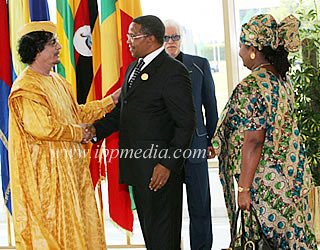
Tanzanian President Kikwete greeting African Union chair Khadafi of Libya at the AU Summit in Sirte., a photo by Pan-African News Wire File Photos on Flickr.
SADC in new plan for regional peace, security
Saturday, 24 November 2012 00:00
SOUTHERN Africa has a new strategic plan for regional peace and security covering five sectors — political, defence, state security, public security and police. The plan, developed by the Southern African Development Community (SADC), was launched on 20 November in Arusha by the Tanzanian President, Jakaya Kikwete.
Kikwete, who is the current Chairperson of the SADC Organ on Politics, Defence and Security Co-operation, urged Member States to make resources available for implementation of the Revised Strategic Indicative Plan of the Organ (SIPO).
“Peace is an important aspect in regional prosperity, hence there is a need for member countries to chip in with enough resources to make the bloc calm and stable,” Kikwete said. “Efforts towards making our region calm are in our hands . . .
“It is time for member countries to start allocating enough resources to address the emerging challenges . . . We shouldn’t wait for other people to act on our behalf.”
Kikwete also stressed that political will is needed to move forward. Speaking at the same occasion, the SADC Executive Secretary, Dr Tomáz Augusto Salomão, emphasised the need to preserve “peace, security, stability and democracy, as a prerequisite for regional integration and sustainable development”, in order to address the challenges posed by the new political, economic and social context in the region.
Salomão traced the history of the Organ on Politics, Defence and Security Cooperation established by SADC Heads of State and Government in 1996, and its achievements and challenges, saying that it constitutes a “solid platform for deepening the political co-operation and cohesion in the region”.
The legal instruments already adopted for implementation include various SADC protocols, notably that on politics, defence and security cooperation signed in 2001.
Other protocols are against corruption; for combating illicit drugs; the control of firearms and ammunition; facilitation of the movement of persons; extradition; legal affairs, mutual assistance in criminal matters; and a mutual defence pact.
The first Strategic Indicative Plan for the Organ (SIPO) identifying strategies and activities was adopted in 2003 for implementation over five years. Discussions on revision of the plan began in 2007.
The Executive Secretary identified the key achievements as the integration of the regional police chiefs organization into the Inter-State Defence and Security Committee; establishment of the Regional Early Warning Centre for conflict prevention and management; and the SADC Standby Force.
Salomão also cited establishment of civilian structures such as the SADC Electoral Advisory Council, and the SADC Mediation, Conflict Prevention and Preventive Diplomacy structures.
However, he added that, in addition to these achievements, there are challenges resulting from geopolitics and global dynamics, but also from inadequate coordination mechanisms and a shortage of human and financial resources for appropriate implementation.
The SIPO is to be reviewed at five-year intervals to ensure adequate response to the changing geopolitical environment, and relevance of objectives, strategies and activities in various sectors, as well as to strengthen monitoring mechanisms, human resources and structures.
A main goal of the programme, Salomão said, is to publicise and disseminate the revised SIPO to all stakeholders, to facilitate development of a comprehensive work plan to enable “relevant stakeholders to be true partners in the implementation”.
In launching the new policy document, the Tanzanian President said it is intended to address some of the new challenges facing the region, Africa and the world, noting that SADC plays a “leading role in the unity and cohesion of the region and the continent, while significantly contributing to peace, security, humanitarian assistance and development activities at regional and continental levels.”
Among the new challenges he cited are piracy, climate change, human trafficking, illegal immigration and economic recession.
Specific challenges, in addition to poverty, are the deteriorating situation in the Great Lakes Region, notably the worsening conflict in eastern Democratic Republic of Congo (DRC).
He appealed again to the parties for a ceasefire, “taking into account that innocent civilians are the ones who are most highly affected.”
The launch was witnessed by senior defence, police and correctional services officers from Tanzania, and senior government officials and diplomats from SADC member states, as well as research and academic institutions attending a symposium on the new strategic plan.
SADC has 15 member states including DRC, but Madagascar is currently suspended following a non-constitutional change of government in 2009. — sardc.net.
No comments:
Post a Comment